Startups still wary of hiring women despite government decision to pay for 7 weeks of maternity leave benefit

The Indian government’s recent announcement that it would pay for seven weeks of the extended maternity benefit period was seen as a welcome initiative for businesses, but the move has done little to turn startups’ hiring strategies in favour of women.
According to a survey by community social media network LocalCircles, startups and small and medium enterprises (SMEs) are still wary of hiring women, owing to added financial burden after the government increased the paid maternity leave benefit to 26 weeks from 12 weeks in 2017.
The LocalCircles’ survey, which polled over 8,000 startups and SMEs from across India and received more than 15,000 votes, showed a large majority of these companies view the 19 weeks of business paid maternity benefit leave as “too much” to cover, as they expressed concern that the government reimbursement for seven weeks of maternity benefit may take a long time to come.
Sachin Taparia, Chairman and Managing Director, LocalCircles, says,
“Although it is a forward-looking move by the government, businesses fear that its implementation may take a while and foresee many hiccups before the reimbursements get reflected in their bank accounts."
As part of the survey, 42 percent of startups and SMEs said they will not hire female employees at all, when asked if their hiring policies will change, now that the government has agreed to pay over 50 percent of the extended maternity leave. In contrast, 23 percent said they will definitely hire more women, while 35 percent said they ‘might’ hire more women.
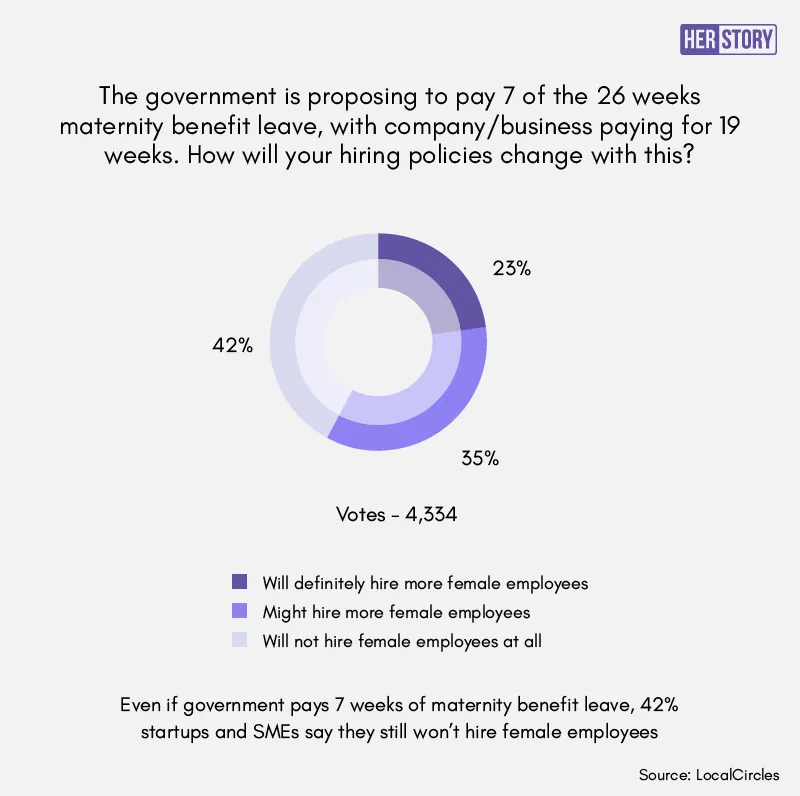
Last year, a similar poll run by LocalCircles predicted that the extended maternity leave for women will negatively impact the hiring of women employees by companies, especially by startups and SMEs due to the added financial burden.
Ritu Mittal Mukherjee, Head – Engagements, Baby Chakra, says,
“The subsidisation of the paid maternity leave is an absolutely welcome move, especially when applicable for both the government and private sectors. However, the actual implementation, guidelines, eligibility criteria, (and) documentation processes will define its true success and reach."
“As a startup in the parenting category, we truly believe that a woman's gender and her life stage (planning or expecting a child) should not be a deterrent to her employment,” she adds.
Maternity Benefit: State of women hiring in startups and SMEs
Last year, another poll run by LocalCircles predicted that the extended maternity leave for women will negatively impact the hiring of women employees by companies, especially by startups and SMEs due to the added financial burden.
True to its word, the most recent LocalCircles’ survey showed an increase in the number of businesses who have hired only men in the past six months.
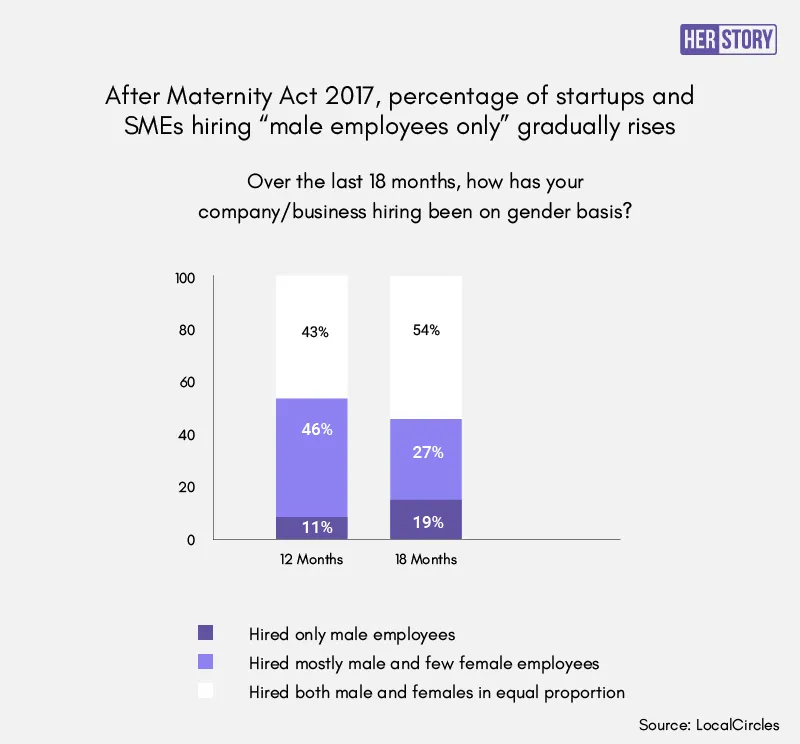
Over the past 18 months, 19 percent of startups surveyed said they hired only men, while 27 percent said they hired mostly men and few women. Over half of the companies, or 54 percent, said they hired both men and women in equal numbers.
By comparison, companies who hired only male employees stood at 11 percent in an earlier 12-month poll by LocalCircles. That number has since risen to 19 percent in the 18-month poll.
“For small, early-stage startups and SMEs that have just 5-20 member teams and are operating on private capital, they simply do not have the financial wherewithal to afford 26 weeks of pay or the first 3 months of transitioning an employee out and another 3 months to transition her in,” says Sachin.
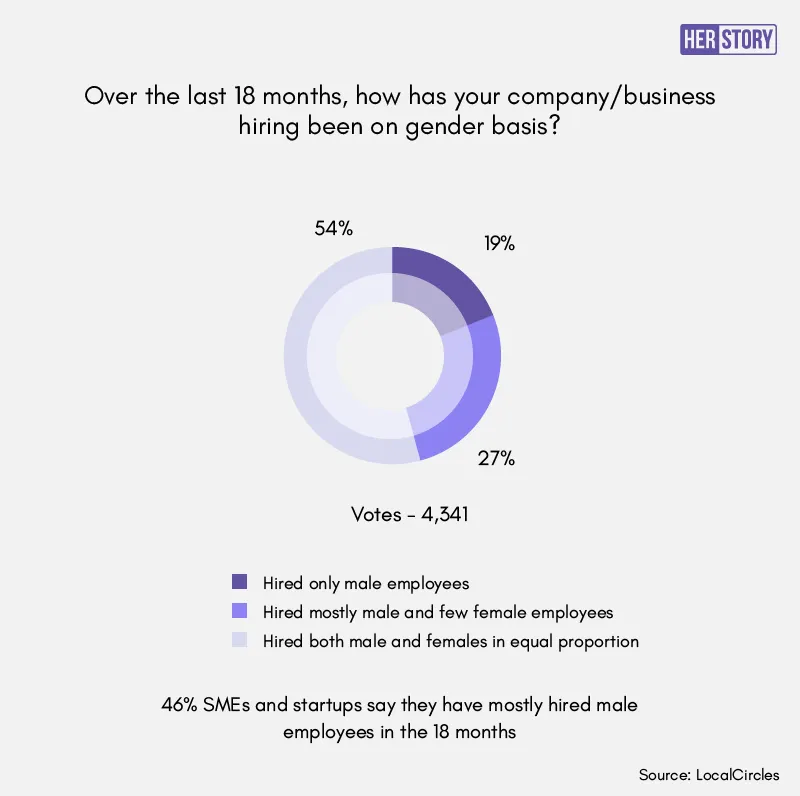
Indeed, following the amendment to the Maternity Benefit Act last year, the Ministry of Women & Child Development received a slew of complaints over corporates’ hesitation to hire women after the extension of maternity leave to 26 weeks.
In the wake of such complaints, WCD Minister Maneka Gandhi met the Labour Ministry, and they jointly made the decision to reimburse the salary for 7 weeks of maternity leave benefit.
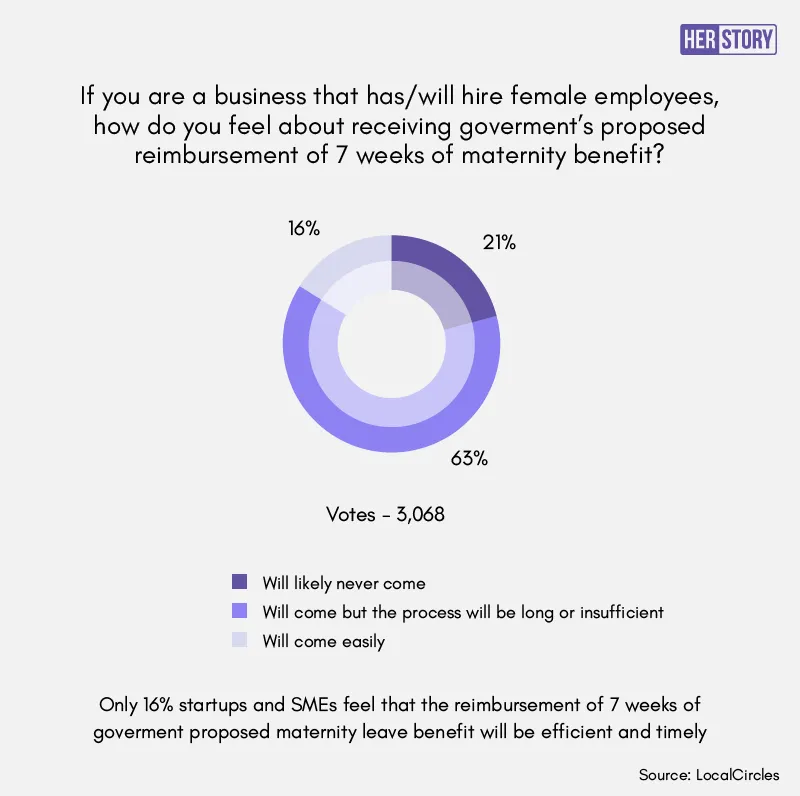
A majority of the SMEs and startups surveyed by LocalCircles – 63 percent to be precise –were skeptical, saying the government “reimbursements will come but the process will be long or inefficient.” Only 16 percent said it will come easily, while 21 percent said the reimbursements will never come.
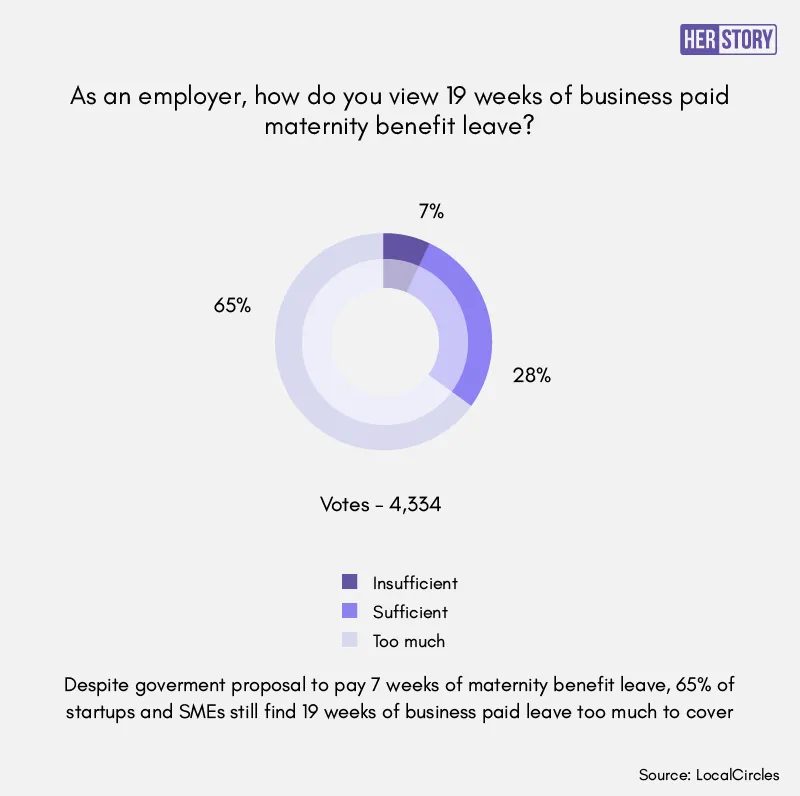
In addition, 65 percent of startups surveyed said they view the 19 weeks of company paid maternity leave as “too much,” while 28 percent feel that number was sufficient. Only 7 percent said it was insufficient.
“One important piece is that startups are extremely agile and evolve on a daily to weekly basis. So for someone to be on leave, a challenge when she rejoins is getting upto speed on the work status. Having said that, today technology is the solution and can simplify the entire process of flexible work and work from home prior to coming back to work,” adds Ritu.
As in the past, LocalCircles says it will submit the findings of this survey to relevant government stakeholders for their consideration.
For small startups, which have less than 20 employees and earn annual revenues of less than Rs 1 crore, we have recommended that the government provide them with an exemption, says Sachin.
“Only such kind of flexibility will help turn the hiring strategies in favour of women in small, pre-series A-stage startups and enable them to hire more female employees,” he adds.







